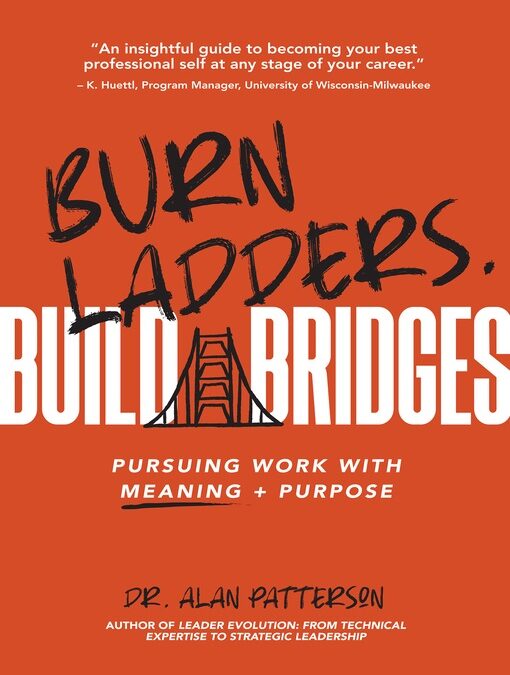

Alan M. Patterson almost uncovers a tonality akin to Robin Williams’ character of Keating in Dead Poets’ Society. Altruistic, but never to the detriment of the topic at hand, or for the sake of emotionality over coldly pragmatic logic. “Burn Ladders. Build Bridges. undoes the status-quo of career enhancement. Tearing up the playbook and finding breakthrough ways to create impact, build meaning, fuel your passion to do bigger, greater things–while enjoying the entire journey. No matter what stage you’re currently in,” writes Patterson at the beginning of the book. “…Unlike other career wisdom, you’ll find the balance of theory and practicality.
ABOUT THE AUTHOR: http://www.mentore.com/about/dr-alan-m-patterson/
Of success and connection. And you’ll be able to demonstrate leadership and find your purpose in whatever position you’re in, organization you work for or business you create. By connecting with others, and more importantly, with yourself, this book will help you find a new way to contribute to the people and opportunities around you. And, in the process, discover that connecting with others is not what you do–it’s who you are. Welcome. Let’s burn. Let’s build.” From that, Patterson is able to present the resulting material specifics in a manner never feeling shoehorned in. There’s a sort of relaxed pace even during some of the more intellectually heady, dense sections of the book. At the end of the day, this sort of literary vibe is part and parcel with the actual corporate philosophy itself Patterson promotes.
That’s part of his craft. He’s able to make everything presentationally consistent and coherent, never feeling tangential or colored outside the lines. You feel like you’re in good hands. At the end of the day, it boils down to willingness for flexibility, adaptation, and learning. Never remaining trapped in old ways, no matter how by the book or established they may appear.
“Education is a game where the environment is hard at work to create and shape human behavior. Education is an achiever’s field of dreams. What achievers like about the process is the focus on task performance. They take ownership for when and how much they prepare, to ready themselves for performance. Give them the assignment, get out of their way, and let them get to work. They know what they must do,” Patterson writes. “They like the fact that it’s a solo activity. Others just slow them down. Grades, comments, and teacher recognition are the type of feedback they crave. Playing the game means advancing to the next big thing. Learn more. Study harder. Do more. Solve that problem in five minutes or less.
AMAZON: https://www.amazon.com/Burn-Ladders-Build-Bridges-Pursuing/dp/163742213X
Quote that author. Beat your best test score. Winning means getting the right answers.” From this, Patterson is able to introduce the concept of the Ladder – the trajectories one makes up the corporate hierarchy echelons that can be adhered to, observed as recipes for success, and from that ultimately revised, altered, or titularly burned. “Every position exists inside a larger context, but that doesn’t appear to be a top priority in the Ladder Climbing world. As a Ladderburner, however, the big picture is important—first, to understand it, and second, to figure you how you can impact it, particularly as you move forward,” Patterson states. “Building context is a way to put things into perspective. It enables you to think about opportunities that are possible, even if they don’t currently exist. Understanding context begins with your current position.”
Cyrus Rhodes



























